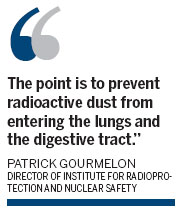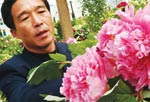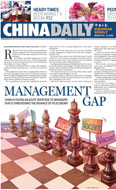Health
Evacuation, confinement and iodine help protect against nuclear fallout
Updated: 2011-03-16 08:06
(China Daily)
 |
Evacuation, temporary shelter and iodine pills are the chief weapons for protecting civilians against nuclear fallout, experts say.
Japan is racing to prevent a nuclear disaster, as explosions rocked overheating reactors after cooling systems at the reactors failed following Friday's quake.
Specialists say the authorities have a several-pronged strategy for shielding civilians if there is an explosive breach of the reactor, as in the April 26, 1986, Chernobyl disaster.
In that event, a cloud of radioactive dust spread over parts of Ukraine and Belarus, triggering a surge in cancer and birth defects. The death toll ranges from a UN 2005 estimate of 4,000 to tens or even hundreds of thousands, proposed by non-governmental groups.
"There are three weapons against contamination - evacuation, confinement and iodine," says Patrick Gourmelon, director of radioprotection at a French nuclear watchdog, the Institute for Radioprotection and Nuclear Safety (IRSN).
About 200,000 people have already been evacuated from residential areas around Fukushima, located 250 km north of Tokyo.
Confinement is a highly effective tool pending evacuation to a safer area.
It consists of taking shelter in an enclosed space, preferably a basement room, whose doors and windows are then sealed tight with plastic sheets and adhesive tape.
"The point is to prevent radioactive dust from entering the lungs and the digestive tract," says Gourmelon.
"You take a good shower to remove any contact between the fallout and the skin, but you shouldn't scrub, because this helps particles to penetrate," he says. Nail-biting, smoking and sucking or licking one's fingers are also out.
In a nuclear alert, the authorities also hand out iodine pills to prevent cancers of the thyroid, which is a particular risk for babies, young children, teenagers and expectant or breast-feeding mothers.
The goal is to saturate the thyroid with "healthy iodine", shielding it from radioactive iodine, says Gourmelon.
Timing, though, is essential. Preferably, the iodine is taken an hour before a known fallout incident. Japanese guidelines say the pills should be distributed when the likely absorbed dose of radioactivity is 100 milligray, a unit named after a British physicist.
"You can also take it in the following 24 hours after the incident," he says. "It does work but the protection is reduced to 25 percent."
Agence France-Presse
E-paper

Rise and shine
The Chinese solar energy industry is heating up following recent setbacks in the nuclear sector
Bombs aim for regime change
CSI, with a twist
Literary path
Specials

Peony express
Growers of china's unofficial national flower are reaching out to europe for help

Tea-ing up
More turning to Chinese tea for investment opportunities like vintage wine

A cut above
The ancient city of Luoyang is home to a treasure trove of cultural wonders.
